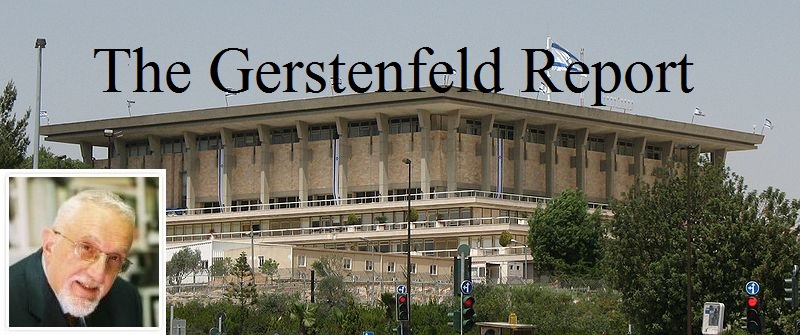This is Dr.Gerstenfeld’s article on the first week of the second elections campaign in Israeli elections. The Tundra Tabloids is the only place in English where it will be published.
SECOND ISRAELI ELECTIONS
First week May 30-June 5, 2019
Manfred Gerstenfeld
 On May 29th, the 21st Knesset decided to dissolve itself after outgoing Prime Minister Binyamin Netanyahu failed to form a government. The majority vote in favor of the dissolution also indicated that no alternative government could be formed. The new elections are scheduled for September 17. In the interim Netanyahu remains prime minister. He has fired New Right Ministers Naftali Bennett and Ayelet Shaked, who are no longer Knesset members.1
On May 29th, the 21st Knesset decided to dissolve itself after outgoing Prime Minister Binyamin Netanyahu failed to form a government. The majority vote in favor of the dissolution also indicated that no alternative government could be formed. The new elections are scheduled for September 17. In the interim Netanyahu remains prime minister. He has fired New Right Ministers Naftali Bennett and Ayelet Shaked, who are no longer Knesset members.1
The outcome of the April 9 elections had two key characteristics. The right of center parties received 65 out of 120 seats. Besides the Likud, with 35 seats, no other party on that side received more than 8 seats. The second main characteristic of the election results was that the lead opposition party, Blue and White also received 35 seats. None of its possible government partners, Jewish or Arab, received more than six seats.
This outcome suggested that it might be best if the Likud, together with one or two of the smaller right-wing parties, had formed a coalition government with Blue and White. The latter party, however, had committed itself not to serve in a Netanyahu-led government. The Likud did not want to replace Netanyahu as prime minister.
The dissolution of the Knesset was inconvenient for some parties yet convenient for others. There are also some other parties of which it is not clear whether the dissolution will be beneficiary or detrimental for them.
Netanyahu had initiated the dissolution of the Knesset. He tried everything to form a coalition, part of which is probably still unknown. This included offering the Labor party the opportunity to join his coalition. This offer was turned down. New elections might give Netanyahu a second chance to cobble a majority together to form a government.
Another potential beneficiary of the Knesset dissolution is the New Right party led by Naftali Bennett. In the April elections it almost succeeded to pass the 3.25% entrance threshold. Bennett may decide to have his party run alone or enter into a tactical alliance with another party. Yet the failure to pass the election threshold indicates that a right-wing party with an equal number of religious and non-religious candidates may not be a viable concept.
 The Zehut party led by Moshe Feiglin remained in April substantially under the election threshold. It may also enter into a tactical alliance. If all previous voters of New Right and Zehut vote in September for right-wing parties, there may be a bigger majority for Netanyahu.
The Zehut party led by Moshe Feiglin remained in April substantially under the election threshold. It may also enter into a tactical alliance. If all previous voters of New Right and Zehut vote in September for right-wing parties, there may be a bigger majority for Netanyahu.
Kulanu, led by Moshe Kahlon, only received 4 seats in the April elections. If it were to run alone in September it might not pass the threshold. Yet, new elections give him and his co-parliamentarians the chance to join the Likud and thus be virtually assured of entering the next Knesset.
The dissolution of the Knesset is most inconvenient for the Labor Party. Its current chair, Avi Gabbay, has led the party to a disastrous defeat. Labor only holds six seats and has never before been in the position of a single digit number of parliamentarians. The party must soon elect a new chair and also decide whether to hold new primaries. Labor must alone decide whether to run alone in September or on a joint list with the extreme left Meretz party.
Blue and White, the leading opposition party, has little to gain from the new elections. Its performance, however impressive, did not remotely enable it to form an alternative government. Nor is it likely that it will be in a position to do so after the upcoming elections.
 Israel Beiteinu led by Avigdor Lieberman, could be a major winner or loser in the new elections. Lieberman did not agree with Netanyahu on a government program or which ministries to accept. This was the reason that Netanyahu could not form a government, as without Israel Beiteinu’s support he was one vote short of a majority in the Knesset. In the negotiations Lieberman positioned himself as a champion of secular Israel, unwilling to make concessions to the religious parties. Yet he has frequently declared that he will only join a right-wing government.
Israel Beiteinu led by Avigdor Lieberman, could be a major winner or loser in the new elections. Lieberman did not agree with Netanyahu on a government program or which ministries to accept. This was the reason that Netanyahu could not form a government, as without Israel Beiteinu’s support he was one vote short of a majority in the Knesset. In the negotiations Lieberman positioned himself as a champion of secular Israel, unwilling to make concessions to the religious parties. Yet he has frequently declared that he will only join a right-wing government.
Whether this “secular championship” will give Israel Beiteinu several more seats than the five it holds in the current Knesset is unclear. Yet it cannot be excluded that the Likud and other right-wing parties can form a government after the September elections without the votes of Israel Beiteinu.
In the coming weeks several parties will have to decide whether they will run alone or combine their lists for the purpose of the elections. The right’s aim is to recoup the lost votes of the New Right and Zehut. On the left there is only the modest number of votes of Orly Levy-Abekasis’ Gesher party to recover. Will Blue and White or Labor offer her the chance to run on their list?
The first polls are already out. They show that the Likud — without Kulanu — and Blue and White will again receive approximately the same number of seats. As far as the ultra-Orthodox parties are concerned, the results in this election may probably not differ more than one seat from the previous election. The same is true for the Arab lists. One lingering question is how many parties will aim for the moderate orthodox voters.
Soon also the political mudslinging will resume. Most Israelis detest this. They would also prefer a vacation without electoral propaganda. The politicians, however, can seemingly not afford to do what the voters want.
Footnote:



